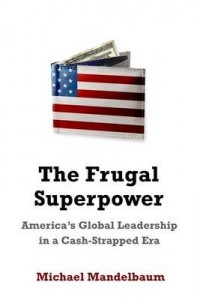This week I read the book “The Frugal Superpower,” by Michael Mandelbaum. For much of the beginning, I couldn’t quite figure out what this book had to do with energy. But I kept on going and was rewarded by some true insights as to other good reasons why reducing our dependence on Middle Eastern oil can help our country out of some if its current mess.
 In the book, Mandelbaum takes on the challenge of laying out why America’s expansive foreign policy is coming to an end and the consequences of such an action. Let’s face it, America needs to tighten it’s purse strings – the country has phenomenal deficits, is still trying to recover from a financial crash and its entitlement programs such as Social Security, are running out of money. So what should go by the wayside? America’s underwriting of global security that dates back to the 1940s.
In the book, Mandelbaum takes on the challenge of laying out why America’s expansive foreign policy is coming to an end and the consequences of such an action. Let’s face it, America needs to tighten it’s purse strings – the country has phenomenal deficits, is still trying to recover from a financial crash and its entitlement programs such as Social Security, are running out of money. So what should go by the wayside? America’s underwriting of global security that dates back to the 1940s.
Mandelbaum is not naive to what could happen when the U.S. stops fighting the wars of others, but he is also very aware of what will happen if the U.S. continues to fight all the wars of others. It will put our “Superpower” status in more jeopardy. Whereas realigning our foreign policy could actually strengthen our position.
The war in Iraq is over oil – a commodity that our country cannot live without.
Mandelbaum writes, “Because the United States accounts for so much of the world’s oil usage, a major reduction in American consumption could lower overall consumption enough to reduce the global price of the commodity. This would decrease the money accruing to the governments that depend heavily, in some cases almost exclusively, on the sale of oil to finance their operations. Iran is one such country. The sale of oil account for 80 percent of its annual revenue. Reducing the income of the Islamic Republic would give its rulers less money to spend on the policies that threaten the rest of the region and the world….Restricting the stream of Iranian oil revenue would have an even more powerful effect on the regime: It would undermine its internal stability.”
 Mandelbaum continues by explaining another benefit of reduced oil on Middle Eastern policies – the less the world relies on oil, and therefore the less it relies on oil from that region, the less important to the rest of the world the region will be. Ultimately, he concludes that the reduction of oil qualifies as the single most important thing the U.S. can do to achieve its international goals.
Mandelbaum continues by explaining another benefit of reduced oil on Middle Eastern policies – the less the world relies on oil, and therefore the less it relies on oil from that region, the less important to the rest of the world the region will be. Ultimately, he concludes that the reduction of oil qualifies as the single most important thing the U.S. can do to achieve its international goals.
So what should happen in this new age of scarcity? Mandelbaum lays out a strategy of containment that includes moving to renewable energies in addition to oil and lobbies for a substantial tax on gasoline. This tax would lessen oil use, spur growth in renewable energy so it can be economically competitive and demonstrate that America has the wherewithal to address a major problem.
He concludes, “It would demonstrate, finally, that the United States is capable of taking steps to deal with an issue that affects the entire world. It would offer, that is, a vivid example of American global leadership.”
This book offers the best case I have ever seen that oil is a major risk to American security and presents it in a way that a true politician, worried about foreign relations, cannot deny why our country needs to move to renewable energy.

